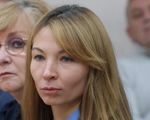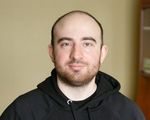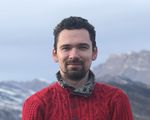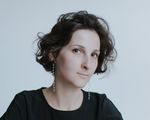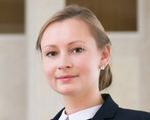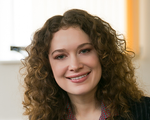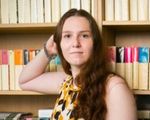About Success Builder
How do you find your place in life? How do you find something to do that both comes naturally to you and makes you happy? The answer is that you have to apply the knowledge you’ve gained from university and from life itself correctly. The Success Builder Project features HSE University graduates who have discovered themselves through an interesting business or an unexpected profession. The protagonists share their experiences and lessons learnt and talk about how they’ve made the most of the opportunities they were given.
Alexander Aksakov, who graduated from ICEF in 2011, now works as a Senior Associate in the New York office of Credit Suisse. He tells Success Builder how the wedding of an ICEF graduate became a gathering of economists from around the world, how U.S. employers recruit candidates in bars and how to earn an MBA from one of the world’s most prestigious schools.
Why did you need to study economics, and why at HSE?
My father is an economist and I constantly heard about banks, business and finance growing up, and that’s why I didn’t consider any other options for my field of study. Programming was the only thing that interested me apart from economics. I went to high school at the Lyceum of Information Technology in Moscow and constantly read books about various programming languages, studied databases and wrote programmes and created websites at night. That’s why I was also looking at the Moscow State University (MSU) Faculty of Computational Mathematics and Cybernetics, but ICEF won out in the end. To some degree, I followed in my father’s footsteps — he studied at MSU under Sergey Yakovlev. In fact, many of his instructors, including Evgeny Yasin, came to HSE from MSU. So, for all of us, including my older brother, who also graduated from ICEF, this was a sign of trust and quality.
When I entered ICEF, I saw myself ultimately becoming a businessman. I always liked the degree of independence you have when you work for yourself and when you constantly develop to keep up with the market.
You can’t stand still in business if you want to stay competitive
That gets me going and I really like the idea of always being in the lead and doing something better than everyone else.
In business, you also have to take risks and learn to write mistakes off to experience — had you thought about that?
You definitely need to have a predisposition to business. It is very important to know the financial world and understand the economic foundations, but more than that, you need to be able to take calculated risks. If you fail, you can’t retreat, but must keep moving forward. I currently work in the corporate world where I analyze business models every day and apply an excellent understanding of the market. This will doubtless lead me to my own business one day.
Students say only the strong survive ICEF. Is it really so difficult and does holding an ICEF degree help you get your foot in the door?
Even before I studied there, my older brother told me about studying at ICEF and recalled the words of his instructor, Jeffrey Lockshin, who said, ‘Studying at ICEF is no walk in the park.’ I was mentally prepared for the heavy workload and the programme’s academic focus. But even with my strong background in math after studying at the lyceum, it was still challenging: ICEF students have to maintain a very demanding pace and standard. The main problem for me was combining the time-consuming educational process with social life at HSE.
I am a very sociable person. I love hanging out with friends and in this new environment, I also needed to devote time to meeting people and socializing.
Taking part in the social life at HSE led me to an interest in electronic music, which I still enjoy to this day
ICEF really does give you a lot academically, practically and socially. Of course, a lot of the theory does not find a frequent application at work, but knowing the foundation is vitally important for professional success. Having this knowledge base makes it possible to reduce global economic processes or complex calculations to the particulars. Knowing the fundamentals helps you look at everyday tasks from an academic perspective and this, in turn, gives you an understanding of the cause and effect relationship of this or that model.
How did the social aspect affect your future life? Did the connections you made at the university prove important?
Most of my closest friends are connected directly or indirectly with HSE. This includes classmates, their friends and the guys who shared my tent at the university’s military training camp. It has been nine years since graduation: some of those people are thriving in business while others hold high positions in corporations — and they’re scattered all over the world. Moscow, Hong Kong, New York — I have friends from HSE everywhere. It is an extensive network of close friends, all of whom hold very interesting jobs in a wide variety of fields. Professional benefits aside, I find it interesting simply to communicate with them, and this alone helps me develop.
For example, last year I was a guest at the Washington, D.C. wedding of my brother’s HSE classmate, Vladimir Mukharlyamov (ICEF 2008 graduating class). Vladimir is one of the most prominent HSE graduates I know. He is rated first among ICEF graduates, holds a master’s from LSE and a PhD from Harvard, is a professor at Georgetown University and is just a great person. Many of the wedding guests were from HSE, including philosophy Professor Krister Sairsingh and Vladimir’s college classmates who flew in from every corner of the globe. This made me extremely proud of ICEF, which was mentioned repeatedly at the wedding.
For the 25th anniversary of HSE, I organized a gathering in New York of approximately 30 people. We had a great time at a joint in Manhattan. I know that HSE is very supportive of graduates in London, where it often holds evening meetings.
I’m thinking of creating a global network of HSE graduates or organizing a reunion that would bring them together from all over the world
The level that HSE graduates have attained is truly impressive: these are interesting and incredibly successful people.
How did your career begin? Why did you need an MBA and why did you get it from the University of Chicago?
My work experience before the MBA was interesting. As an ICEF student, I interned at the London office of HSBC as a trader and investment banker. I then worked in the Moscow branch of Deutsche Bank and, after graduating, went to work for a subsidiary of Rosatom that had created a new department for managing priority projects. They needed people with international education and experience in investment banking. That was very interesting work with a young and ambitious team working in corporate finance and M&A transactions. I was given a great deal of responsibility right from the start, but I think I was ready for it. At 23, I became the Deputy Financial Director of Uranium One Holding. I took part in a meeting of the Rosatom Board of Directors where I reported on our international projects to then-Rosatom CEO Sergey Kiriyenko.
Then the team underwent some changes and I decided it was time to expand my horizons and get international experience on a new level. I went to work at Otkritie Bank but almost immediately decided to go to business school, which turned out to be a very time-consuming process. I had to decide which schools to apply to, take the GMAT, then write a separate essay for each school explaining why I wanted an MBA and why I was a 'unique candidate' — keeping in mind that each school had its own criteria for admission. I visited the campuses of most of the prestigious business schools to get a personal look at where I was planning to spend the next two years of my life because only this type of personal contact with a university can tell you whether you’re making the right decision.
I was accepted by several schools but chose to attend what I think is the best school of economics in the world, the Chicago University Booth School of Business. It has produced the most Nobel laureates for the ideas on which modern economic theory is built. These include Milton Friedman, George Stigler, Gary Becker, Eugene Fama along with many other famous graduates of this school. With my bent for mathematics, it was an excellent opportunity to combine practical business knowledge with academic learning from the world’s leading scholars in economics and finance. But the main focus of an MBA programme is to develop the social and leadership sides of your personality.
What makes the Booth School better than others is its individualized approach. People with completely different backgrounds come for their MBAs and many devote their first year to studying basic economics and finance. I was able to choose very advanced courses and study with Nobel laureates. And there is a huge advantage to the fact that people with such a diversity of interests and skills study there — instead of simple answers to questions, you hear non-standard solutions and different points of view. And, because almost all the classes are held as discussions or in groups, you really develop your personal qualities, and particularly your leadership skills. I am incredibly happy that I was accepted to the Booth School and spent two phenomenal years there.
The main thing an MBA teaches is the ability to look at business more clearly and broadly and not only through the prism of economics and finance
You need to have a good understanding of strategy, marketing, management solutions and ethics and be flexible in dealing with non-standard situations. A business school develops these qualities in you very intensively. Booth has a reputation as a tough school where you have to give your best and do a huge amount of homework.
There are also lots of cultural events at the school and it was difficult to find a balance between socializing and studies. We used to joke at Booth, ‘You have studies, job search, networking and sleep, but you can only do three of the four.’ So we always had to sacrifice something.
We always hear that an MBA builds your existential skills, but which specific skills has it given you and how do you apply them in your work?
In one of my favourite MBA courses, Negotiations, we used simulations of negotiations to build our skills. This is very interesting: it combines your fundamental knowledge of economics and game theory with psychology, logic and strategy. Most of the classes are less about quantifiable subjects and more about ethics. For example, a class called The Firm and the Non-Market Environment taught by Professor Marianne Bertrand revolutionized my thinking. I had been accustomed to discussing strictly numerical matters such as the market, companies, money and transactions, but the market itself actually consists of non-market relationships that companies have with the media, state and society.
In ethics, there are often no correct answers: people are guided by internal imperatives and solutions to problems do not come from experience. Good examples are the way the media depicted the BP tanker that caused an oil spill or how digital ethics come into play when Tesla engineers have to teach neural networks how to act in the event of an emergency, and so on. All of this opens some hidden personal potential in you that would have remained buried under all those models and formulae. The ability to be flexible has obvious benefits in both work and life.
Describe the life of an MBA student. What interesting things happen at the university?
The Booth School has a huge number of clubs based on various interests — career, theatre, art, sports, public speaking and even wine. Just imagine how much is happening there and how much any student would want to take part in all of it. Almost all MBA students experience stress from the ‘fear of missing out’ (FOMA). This is the biggest risk of an MBA programme because, at this level, you already understand the power of social connections. And networking here is awesome. The school has a very strong alumni association: if you write to an alumnus who’s a CEO of some company, you can be certain that he will reply. You can also ask a Booth graduate concrete questions on this or that subject and have a cup of coffee 'for the experience.' I now have an 'advisor' in almost every country in the world. It is nice to feel like a global citizen.
Why did you choose to work for Credit Suisse and what is the headhunting process like in the U.S.?
Booth students do internships in summer. In fact, company reps are already on campus by October to recruit for the following summer. My experience is that you can’t find good jobs through a simple Internet search and the companies themselves know this. Everything works through personal contacts. Even the exchange of contacts takes place in analogue format. Some recruiting events are held in bars so that future employers can evaluate you in an informal setting. Recruiters from New York come out to Booth in Chicago to look at the new kids and speak with candidates. An informal screening process called ‘fit’ takes place. By the way, once I joined the Credit Suisse team, I began participating actively in the selection process and last year I was the lead recruiter of my team.
The general view is that if you’ve been accepted to an MBA program, you can definitely cope with the technical aspect of the work, and so recruiters look primarily for people who are a good fit culturally. They spend about two to three months making a list of candidates they like and after a formal interview in January, make their offer for a summer internship. These are essentially 10-week programmes where you do full-fledged work in the company’s offices — in my case, with Credit Suisse. Having done well in my internship, I was invited to join the team permanently after finishing my second year of my MBA.
I started my full-time job at Credit Suisse three years ago and now hold the position of Senior Associate in the Financial Sponsors Group where we provide various investment banking services to private equity funds. My focus is called leveraged finance and it is one of the most active financial markets in the U.S. I work intensively with a very interesting client base, which is what I like. As a result, I worked on several multibillion-dollar deals and participated in negotiations with the heads of major international companies and financial corporations. I am certain that the experience I am getting here will eventually be of use to me in Russia and that I can transfer many Western practices to the Russian reality.
How do new political correctness rules in the U.S. affect the relationship between colleagues and clients?
When you join a large company, you go through various trainings, including masterclasses to become certified with the FINRA financial regulator. Like any other global organization, Credit Suisse takes standards very seriously — you cannot risk losing face: any suspicion of politically incorrect behaviour by an employee can tarnish the brand’s reputation as a whole. For this reason, every three months we must be recertified online through a series of computer tests on various topics. The bank is always trying to recruit people with a variety of backgrounds and personal qualities. This approach has a positive influence on work processes because employees with different cultural experiences, views and personal appearance infuse the company and the team with ‘new blood.’
Tell us about your passion for electronic music: have you ever considered making that your main occupation?
Music continues to be an important part of my life. In even the most serious work with numbers and complex financial models, you need to leave room for creativity and spirit.
My daughter was born not long ago and, thanks to her, I draw inspiration from everything, including music. Many of my mixes are dedicated to my daughter
This hobby began during my student years. We organized an ‘initiation’ for ICEF freshmen at one of Moscow’s famous music establishments and held one of the coolest parties I have ever been to. An incomparable atmosphere, new people, music, lots of happy students — it was the first time I played in front of an audience. It was an unforgettable experience. Before that, I practised at home on very simple ‘turntables,’ but there they had professional equipment and awesome sound. I have often played at other Moscow parties since then. As a result, in Chicago — where, by the way, many famous electronic music performers come from — I headed a music club in my business school. In my spare time there, I wrote new mixes and compositions and held events for students.
Nothing compares with the feeling you have when you play your favourite track and people catch your wave, your mood. It’s like sports in that it helps a lot in your work. I’m looking forward to visiting Moscow: I want to play there because being on home turf always inspires me the most.




